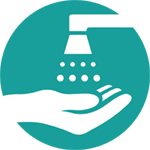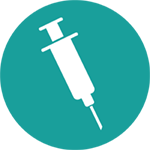Dialysis and Avoiding Infection
When you’re on dialysis, it’s important to avoid infections of any kind. Infections occur when bacteria, viruses or fungi enter the body by touch or inhalation through the nose or mouth. Some people on dialysis may be likely to get an infection due to the vulnerability of their access site or other health conditions like diabetes. People living with kidney disease are also at greater risk for complications related to illnesses like the flu and pneumonia
It’s important to be your own advocate. Remember that you are the person who can have the most direct impact on looking after your health. Staying healthy and avoiding infection can help keep you out of the hospital.
How can I avoid infection?
There are simple steps you can take to help you stay your healthiest:

Practice good hygiene—washing your hands often or using an alcohol based hand sanitizer can help prevent infection.

Care for your access properly—it’s important to follow your nurse’s exact instructions on how to care for your hemodialysis access site or care for your peritoneal access site.

Check for infection—learn the signs and symptoms of access site infection elsewhere in your body. Alert your nurse immediately if you think you may have an infection, so you can receive proper treatment.
If you’re on peritoneal dialysis (PD): infection can cause peritonitis, a serious infection of your peritoneum. Treating peritontis early with antibiotics is important. Tell your nurse immediately if you think you have contaminated yourself during PD treatment or if you suspect you may have an infection.

Get vaccinated—it’s important to get vaccinated as recommended by your doctor or nurse, especially for the flu and pneumonia.

Keep up with treatment for all health conditions—taking all of your medications and completing all treatments exactly as prescribed can help protect your health.
Talk to your nurse or doctor about infection
If you suspect you have an access infection or any other infection in your body, alert your care team immediately. A severe access infection can prevent you from getting dialysis, so it’s important to treat any infection as early as possible. Inspect your access site regularly and look out for redness, draining, tenderness or swelling. Also tell your doctor right away if you have a fever—a sign your body is fighting infection.
Take all antibiotics exactly as directed
Your doctor or nurse practitioner will prescribe the exact dose and duration of antibiotics for your particular infection. It’s important to take your medication exactly as prescribed to clear the infection completely and help prevent recurrence.
